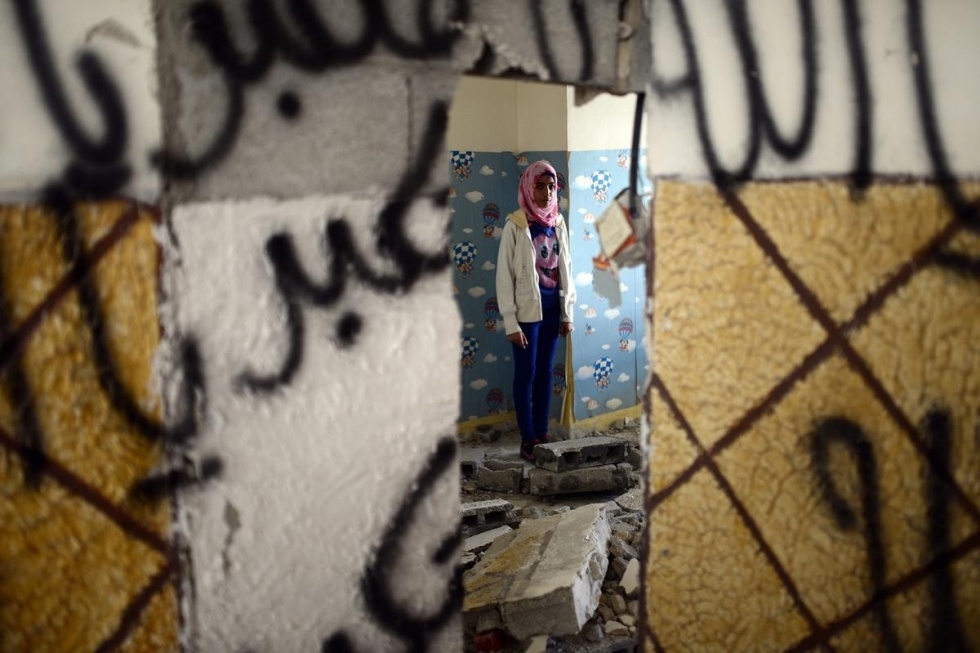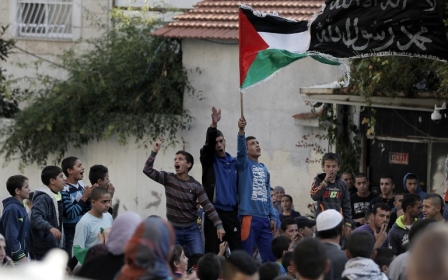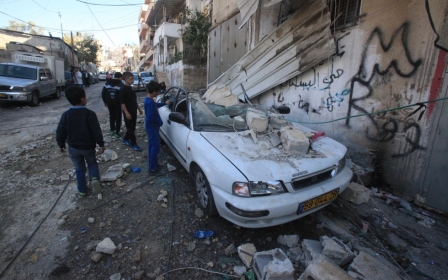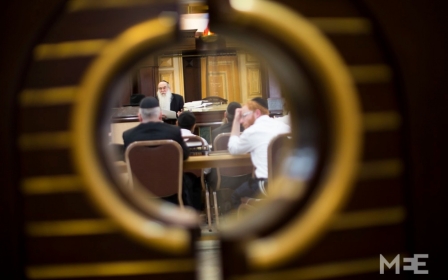Newly homeless in East Jerusalem

EAST JERUSALEM - At the heart of Silwan, this neighbourhood in the shadow of the old city, the family of Abdel Rahman al-Shaludi are searching for a home. Early Wednesday morning, their apartment – home to five children and their parents – was demolished by Israeli authorities.
The move was a punitive demolition: in late October, Abdel Rahman drove his car into a crowded Jerusalem tram stop, killing three-month-old Chaya Zissel Braun and Karen Mosquera, 22, a student from Ecuador. Twenty one-year-old Shaludi was shot dead by police as he fled from the scene.
Relatives told Middle East Eye that everyone living in the building was evacuated during the night, then kept waiting in the street until the early hours when the home was destroyed with dynamite. They say that the life savings – some 80,000 shekels ($20,849) – of family member Tamer al-Shaludi disappeared from the house in the course of the demolition, and suspect soldiers took the money. At present, the family of Abdel Rahman are still searching for a home to rent.
“We’ll leave everything destroyed, as it is now, because we know from experience that the soldiers will come back to check that the house has still been demolished,” Abdul al-Shaloudi, a cousin of Abdel Rahman. “It’s terrible. Not only do you lose your son, but then they come and punish you for something you didn’t do.”
The destruction of al-Shaludi’s home is one of many punitive demolitions that will take place in East Jerusalem over the next few weeks. Already, a demolition order has been placed on the homes of Ghassan and Oday Abu Jamal, who killed five people when they attacked a synagogue with knives and machetes before being shot dead by police on Tuesday. Following the synagogue massacre, Israeli Prime Minister Benjamin Netanyahu said the demolitions of the houses of other attackers will be sped up.
An old policy, revived
The policy is not new. According to Israeli human rights organisation B’Tselem, Israel demolished 664 Palestinian homes between October 2001 and January 2005, as part of punitive measures carried out during the second Intifada. Since then, the policy has fell out of practice. But after the abduction and murder of three settlers teenagers this summer, it returned. So far this year, an estimated 26 people including 15 minors have been left homeless by these demolitions.
In demolishing homes like this, authorities say they’re playing out a policy of deterrence, arguing that responsibility for such heavy consequences for loved ones will discourage potential terrorists. “As soon as you give a ticket to a driver, he breaks the law and he has to pay a fine, it changes the way he behaves. Believe me, whether you like it or not, it’s painful and it hurts,” Israeli Police spokesperson Micky Rosenfeld told MEE. “You pay a fine, and you’ll think twice about whether you break the law or not. That’s the norm anywhere. So that’s the method of deterrence. And these are very serious attacks and we have to do anything that we can to prevent further attacks.”
B’Tselem, with many other Israeli rights groups, roundly condemns policies of home demolitions, as spokesperson Sarit Michaeli explained to MEE. “By our analysis, and any reasonable analysis, this is collective punishment,” she said. “Really that’s the whole point behind it: even if it’s just to deter people, it’s still collective punishment. And this is illegal under both international and Israeli law. The whole social and legal system is based on the principle that people should be punished for their own actions and not the actions of others. And this does the complete opposite.”
In Silwan, Abdul al-Shaloudi – dealing on Thursday with the demolition of his relative’s home – slammed the deterrence argument. “They will always try to punish the people around you, because they think that people who are considering doing these things will think twice if they know their families will suffer and that their house will be destroyed,” he said. “But I know how we are thinking, and this kind of action just makes people more angry, making them to hate the Israelis more, and even more wanting to do something against the Israelis. It’s unbelievable how stupid they are, closing the roads, sending people to jail, always making life more miserable.”
Tightened laws
Demolishing the homes of communities is not the only response to recent attacks that have impacted the wider Palestinian community. After Abdel Rahman al-Shaloudi drove his car into a tram stop in October, Jerusalem Mayor Nir Barkat instructed municipal department heads to tighten law enforcement for such violations as traffic offences or unlicensed buildings and businesses, purely in East Jerusalem neighbourhoods. The rationale for the crackdown was clearly stated: to “compel the Palestinian public to act against Palestinian youth who have been clashing virtually daily with police”.
In neighbourhoods like Abu Tor and Issawiya, the impact of the measures has been keenly – and increasingly – felt. Roadblocks were set up, police appeared on every corner, and residents report that drivers going in and out of neighbourhoods are being thoroughly checked – for tax, MOT, identification papers – and harshly punished for small infringements. Young men, who are generally more likely to be arrested by Israeli authorities, say that the heavy military and police presence has been particularly stressful.
“The blocked roads meant that buses had to stop before they reached the village and everyone had to walk 200 metres into the village,” Mohammed Abu Hummus, a popular resistance leader in Issawiya, told MEE. “This obviously made things very difficult for children and the elderly people.”
And while riot control measures like tear gas and foul-smelling “skunk” water have been used in clashes, they’ve also been deployed far from hotpoints of unrest, and even sprayed toward homes and schools. In Issawiya, one resident said the heavy shutters on each of his windows had all been newly installed, protection against the nightly rounds of water and gas that have kept residents awake for weeks.
“People feel like they’re being collectively punished, they feel like it’s direct punishment and revenge and that it’s being connected to the closures of Al-Aqsa Mosque,” Abu Hummus continued. “It’s meant to be connected to the stone throwers but it’s overall punishment, and it’s making everyone’s lives more difficult.”
'You just don't go'
On Thursday, Abu Hummus and volunteers were collecting tear gas grenades to create an art installation. After half an hour, nearly 100 empty canisters had been gathered, even though most are taken to be sold for waste metal parts.
In Silwan, Abdul Shaloudi has also observed the effect of widespread crackdowns and an intensified police presence. “It’s everywhere,” he told MEE. “There’s a lot of soldiers, and checkpoints everywhere. If you want to go and get something from the supermarket, you just don’t go, even if it’s in the day.”
On Wednesday, Abdul said, one of his employees was beaten by a soldier. “He was saying it was payback time. They want to take their revenge on all us Palestinians,” he said.
It’s a sense shared by many Palestinians in East Jerusalem, and an uncomfortable consideration for many Israelis. Even as it appears all over Palestinian neighbourhoods, the notion of collective punishment is still viewed with distaste in its most transparent manifestations. When Ashkelon Mayor Itamar Shimoni announced a partial ban on Arab workers late Wednesday, the move was condemned by politicians from the left and right, though Itamar himself continued to defend it.
Officials from both the Shin Bet and the Israeli Army, too, have condemned punitive home demolitions, and even implied that the policies may be counter-productive. Many suggest that strategies resembling collective punishment are political rather than strategic: an attempt by officials to be seen to be doing something in the face of chaos.
“You don’t have to be a human rights defender to know that if you’re being sprayed with disgusting water because a youth did something in your neighbourhood that you may or may not disagree with, then that’s not something that’s going to make you very happy,” Sarit Michaeli of B’Tselem said. “Although we argue that it’s not really about whether this is effective or not. It’s about whether this is acceptable ethically and morally."
Middle East Eye propose une couverture et une analyse indépendantes et incomparables du Moyen-Orient, de l’Afrique du Nord et d’autres régions du monde. Pour en savoir plus sur la reprise de ce contenu et les frais qui s’appliquent, veuillez remplir ce formulaire [en anglais]. Pour en savoir plus sur MEE, cliquez ici [en anglais].




